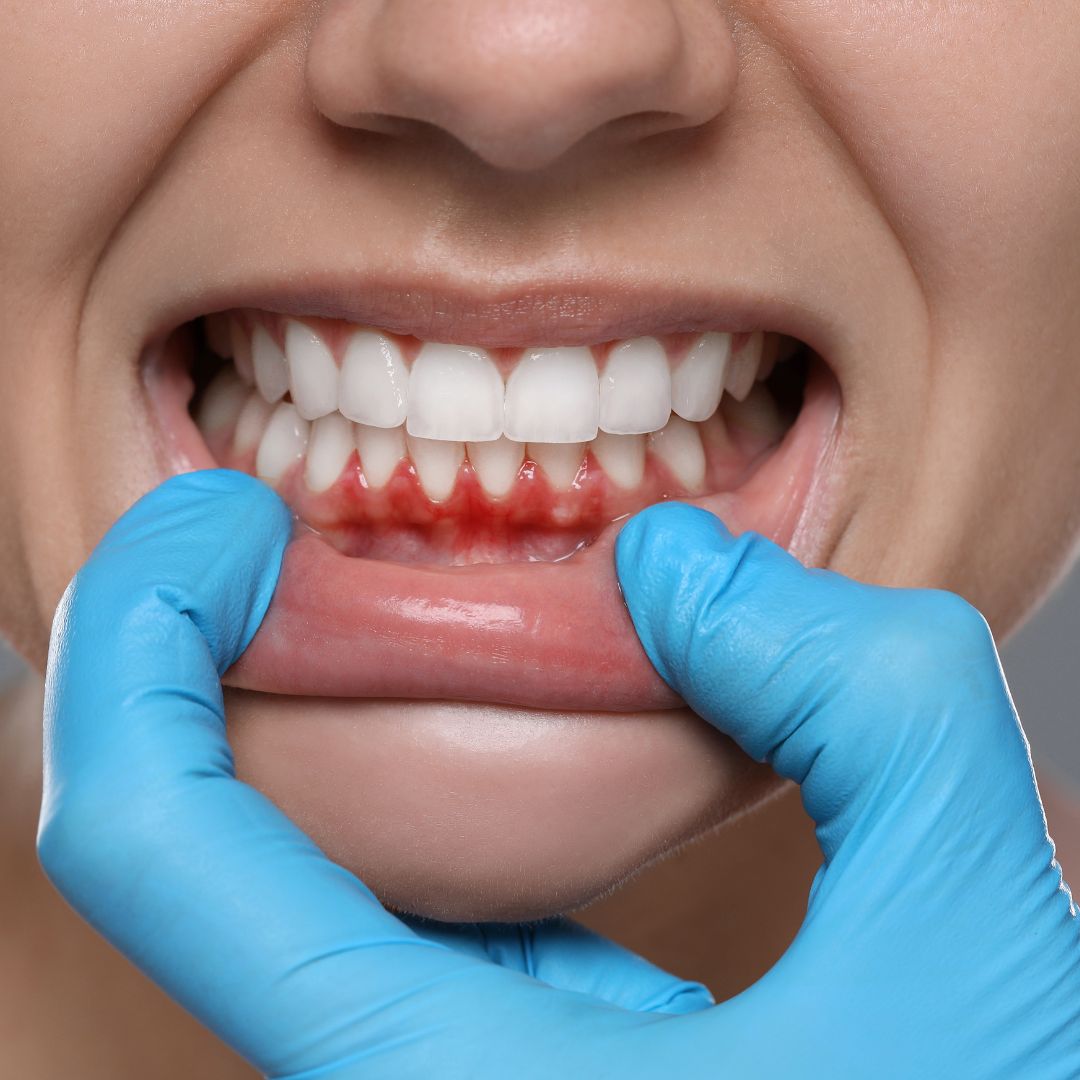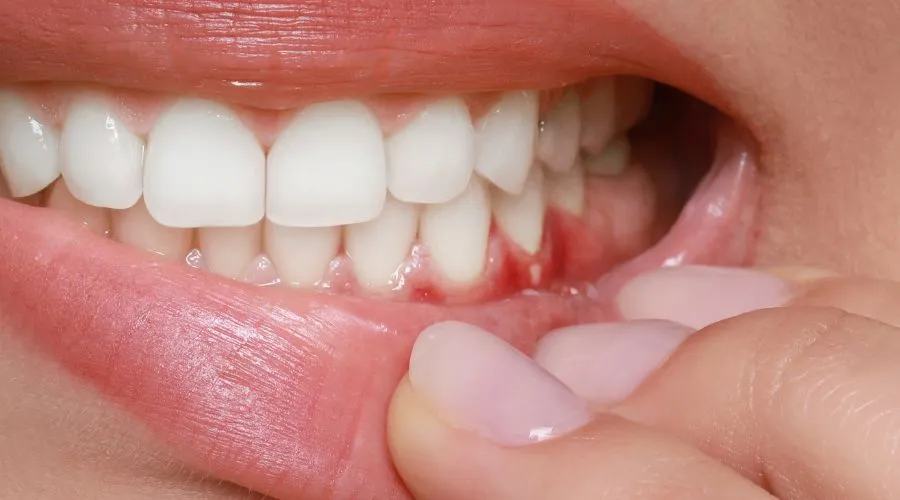Gum Infection Symptoms and Treatments

Gum infections are among the most common dental problems affecting millions of people worldwide. Also known as periodontal disease or gingivitis in its early stages, gum infections can range from mild irritation to serious conditions that threaten your oral and overall health. Understanding the signs, causes, and treatment options is essential for maintaining healthy gums and preventing complications.
What Does a Gum Infection Look Like?

Recognizing gum infection symptoms early is crucial for effective treatment. Healthy gums should appear pink, firm, and fit snugly around your teeth. When infected, gums undergo noticeable changes that serve as warning signs.
The most obvious visual indicators include red, swollen, or puffy gums that may appear darker than usual. You might notice your gums bleeding easily when brushing, flossing, or even eating. The gum line may appear to be pulling away from your teeth, creating pockets where bacteria can accumulate. In severe cases, you may see pus between your teeth and gums, and your teeth might appear longer due to gum recession.
Other symptoms include persistent bad breath that doesn’t improve with brushing, a metallic taste in your mouth, and loose or shifting teeth. Some people experience pain when chewing or notice changes in how their teeth fit together when biting down.
How to Tell if Your Gums Are Infected
Identifying gum infections goes beyond visual inspection. Pay attention to how your gums feel and any changes in your oral health routine. Infected gums often feel tender or sore to the touch, and you might experience pain when brushing or flossing areas you previously cleaned without discomfort.
Temperature sensitivity is another indicator. If your gums react painfully to hot or cold foods and drinks, this could signal infection. Additionally, if you notice swollen lymph nodes in your neck or jaw area, this might indicate that your body is fighting a gum infection.
The “wiggle test” can help identify loose teeth, which may indicate advanced gum disease. Gently wiggle each tooth with your finger – healthy teeth should feel firmly anchored. Any movement could suggest that the infection has affected the supporting structures of your teeth.
What Causes Gum Infections?
Understanding the root causes of gum infections helps in both treatment and prevention. The primary culprit is bacterial plaque, a sticky film that constantly forms on your teeth. When plaque isn’t removed through regular brushing and flossing, it hardens into tartar, which can only be removed by professional dental cleaning.
Poor oral hygiene is the leading cause, but several other factors increase your risk. Smoking and tobacco use significantly impair your gums’ ability to heal and fight infection. Hormonal changes during pregnancy, menstruation, or menopause can make gums more sensitive and susceptible to infection.
Certain medical conditions also contribute to gum disease risk. Diabetes affects your body’s ability to fight infection, while conditions like HIV/AIDS compromise your immune system. Some medications, particularly those that reduce saliva flow, create an environment where bacteria thrive.
Genetic factors play a role too. Some people are naturally more prone to gum disease regardless of their oral care habits. Stress, poor nutrition, and teeth grinding (bruxism) can also contribute to gum problems.
How to Treat Gum Infections
Professional dental treatment is often necessary for gum infections, but the approach depends on the severity of the condition. For mild gingivitis, a thorough professional cleaning may be sufficient, combined with improved home care.
Moderate to severe infections typically require scaling and root planing, also known as deep cleaning. This procedure removes plaque and tartar from below the gum line and smooths rough spots on tooth roots where bacteria tend to gather. In some cases, dentists may place antibiotic fibers or gels directly into the infected pockets.
For advanced cases, surgical treatments might be necessary. These can include flap surgery to reduce pocket depth, bone grafts to regenerate lost bone, or tissue grafts to cover exposed roots and restore the gum line.
Best Antibiotics for Gum Infections
While not all gum infections require antibiotics, they’re sometimes necessary to control bacterial growth and prevent systemic spread. The most commonly prescribed antibiotics for gum infections include amoxicillin, which is effective against many oral bacteria and generally well-tolerated.
Metronidazole is particularly effective against anaerobic bacteria commonly found in gum infections. It’s often prescribed in combination with other antibiotics for comprehensive coverage. Doxycycline, a tetracycline antibiotic, not only fights bacteria but also has anti-inflammatory properties that can help reduce gum inflammation.
Clindamycin is reserved for more severe infections or when patients are allergic to penicillin-based antibiotics. The choice of antibiotic depends on the specific bacteria involved, the severity of infection, and individual patient factors like allergies and other medications.
How to Treat Gum Infections at Home
While professional treatment is essential for serious gum infections, several home remedies can support healing and provide symptom relief. Salt water rinses are among the most effective home treatments. Mix half a teaspoon of salt in a cup of warm water and rinse for 30 seconds, twice daily.
Tea tree oil has natural antibacterial properties, but it must be diluted properly. Add a few drops to your toothpaste or mix with water for a mouth rinse. Never swallow tea tree oil, as it can be toxic if ingested.
Oil pulling, an ancient practice involving swishing coconut oil in your mouth for 10-20 minutes, may help reduce harmful bacteria. Turmeric paste, made by mixing turmeric powder with water, can be applied to infected gums for its anti-inflammatory properties.
Hydrogen peroxide rinses can help kill bacteria, but use a diluted solution (equal parts 3% hydrogen peroxide and water) and don’t swallow it. Green tea contains antioxidants that may help fight gum disease when consumed regularly or used as a mouth rinse.
How to Get Rid of Gum Infections Without Antibiotics
Many mild gum infections can be treated without antibiotics through improved oral hygiene and natural remedies. The foundation of antibiotic-free treatment is meticulous oral care. Brush at least twice daily with a soft-bristled toothbrush, using fluoride toothpaste and gentle, circular motions.
Floss daily to remove plaque between teeth where your toothbrush can’t reach. Consider using an antimicrobial mouthwash to help control bacteria. Electric toothbrushes can be more effective than manual ones at removing plaque.
Dietary changes support gum healing. Reduce sugar and refined carbohydrates that feed harmful bacteria. Increase consumption of vitamin C-rich foods like citrus fruits, berries, and leafy greens, which support gum health and healing.
Probiotics may help restore healthy oral bacteria balance. Consider probiotic supplements or foods like yogurt, kefir, and fermented vegetables. Staying hydrated helps maintain saliva production, which naturally cleanses the mouth and fights bacteria.
How Long Do Gum Infections Last?
The duration of gum infections varies significantly based on severity, treatment approach, and individual factors. Mild gingivitis may resolve within a week or two with improved oral hygiene and home care. However, without proper treatment, it can persist indefinitely and worsen over time.
More severe infections typically require several weeks to months of consistent treatment to fully resolve. Professional cleaning combined with improved home care usually shows improvement within 1-2 weeks, with complete healing taking 4-6 weeks for moderate cases.
Advanced periodontal disease may require ongoing management rather than complete cure. Even with successful treatment, maintaining results requires lifelong commitment to oral hygiene and regular professional care.
Factors affecting healing time include overall health, smoking status, medication use, and compliance with treatment recommendations. Patients with diabetes or compromised immune systems may experience slower healing.
Can Gum Infections Kill You?
While rare, untreated severe gum infections can potentially become life-threatening. The bacteria causing gum disease can enter the bloodstream through infected gum tissue, leading to bacteremia. In vulnerable individuals, this can cause serious complications.
The most serious potential complication is endocarditis, an infection of the heart valves that can be fatal if untreated. People with existing heart conditions, artificial heart valves, or compromised immune systems are at higher risk.
Research has also linked severe gum disease to increased risk of heart disease, stroke, and complications in pregnancy. While gum disease alone rarely causes death, its connection to other serious health conditions makes treatment important for overall health.
The key is early recognition and treatment. Modern dentistry makes serious complications from gum infections extremely rare when patients seek appropriate care promptly.
Prevention and Long-term Management
Preventing gum infections is more effective and less costly than treating them. Establish a consistent oral hygiene routine including brushing twice daily, flossing once daily, and using an antimicrobial mouthwash. Replace your toothbrush every three months or after illness.
Schedule regular dental cleanings and checkups every six months, or more frequently if recommended by your dentist. Professional cleanings remove tartar that home care cannot eliminate, and regular checkups allow early detection of problems.
Lifestyle factors significantly impact gum health. Quit smoking or using tobacco products, as they severely impair gum healing and increase infection risk. Manage stress through healthy coping mechanisms, as chronic stress weakens immune function.
Maintain a balanced diet rich in vitamins and minerals essential for gum health. Limit sugary and acidic foods that promote bacterial growth. Stay hydrated to support saliva production and natural mouth cleansing.
Frequently Asked Questions
1. Can stress cause gum infections? Yes, chronic stress weakens your immune system, making it harder for your body to fight off bacterial infections in your gums. Stress also often leads to poor oral hygiene habits and teeth grinding, which can worsen gum problems.
2. Is it safe to use hydrogen peroxide daily for gum infections? Using hydrogen peroxide daily is not recommended as it can damage healthy tissue and disrupt the natural balance of oral bacteria. Use it only as directed by your dentist, typically for short periods during active treatment.
3. Can pregnancy make gum infections worse? Pregnancy hormones increase blood flow to gums and change how your body responds to bacteria, making pregnant women more susceptible to gum inflammation and infection. This condition is called pregnancy gingivitis.
4. Do electric toothbrushes work better than manual ones for infected gums? Electric toothbrushes can be more effective at removing plaque and bacteria, especially for people with limited manual dexterity. However, proper technique is more important than the type of toothbrush used.
5. Can children get gum infections? Yes, children can develop gum infections, though it’s less common than in adults. Poor oral hygiene, crowded teeth, and certain medical conditions increase risk in children.
6. Is mouthwash enough to treat mild gum infections? Mouthwash alone cannot treat gum infections. It should be used as part of a comprehensive oral care routine that includes proper brushing and flossing, not as a replacement for mechanical plaque removal.
7. Can gum infections affect other parts of your body? Research shows links between gum disease and heart disease, diabetes complications, respiratory infections, and pregnancy complications. The bacteria from gum infections can enter the bloodstream and affect other organs.
8. How soon should I see a dentist for bleeding gums? If your gums bleed regularly during brushing or flossing for more than a week despite improved oral care, you should see a dentist. Persistent bleeding is often an early sign of gum disease.
9. Can certain medications cause gum problems? Yes, many medications can affect gum health. Blood thinners may cause bleeding, while some drugs reduce saliva production, creating conditions favorable for bacterial growth. Always inform your dentist about medications you’re taking.
10. Are natural remedies as effective as prescription treatments? Natural remedies can be helpful for mild conditions and as supportive care, but they’re generally not as effective as prescription treatments for moderate to severe infections. Severe gum infections typically require professional treatment to prevent complications.
Academic References
- Kinane, D. F., Stathopoulou, P. G., & Papapanou, P. N. (2017). Periodontal diseases. Nature Reviews Disease Primers, 3(1), 17038. https://doi.org/10.1038/nrdp.2017.38
- Tonetti, M. S., Jepsen, S., Jin, L., & Otomo-Corgel, J. (2017). Impact of the global burden of periodontal diseases on health, nutrition and wellbeing of mankind: A call for global action. Journal of Clinical Periodontology, 44(5), 456-462. https://doi.org/10.1111/jcpe.12732
- Chapple, I. L., Mealey, B. L., Van Dyke, T. E., Bartold, P. M., Dommisch, H., Eickholz, P., … & Yoshie, H. (2018). Periodontal health and gum disease classification system: consensus report of Workgroup 1 of the 2017 World Workshop on the Classification of Periodontal and Peri-Implant Diseases and Conditions. Journal of Periodontology, 89(1), S39-S56. https://doi.org/10.1002/JPER.17-0719
